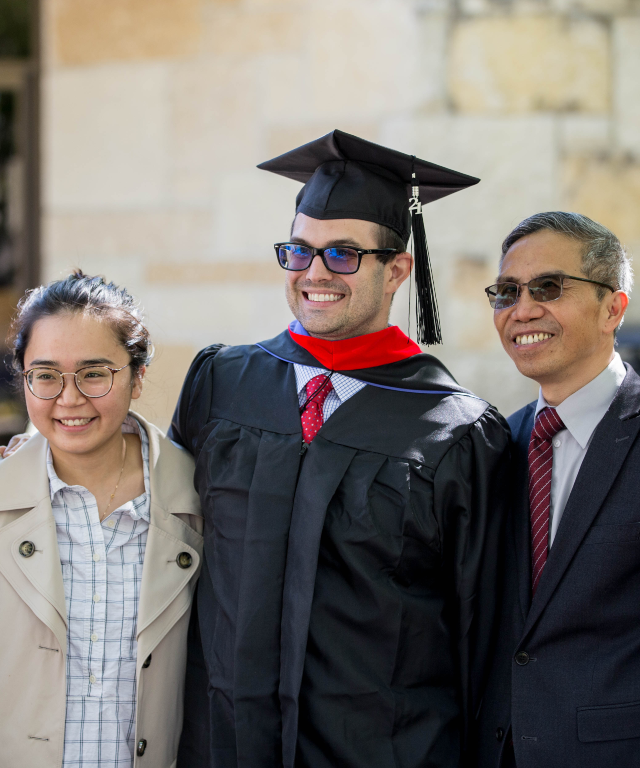Doctor of Philosophy
Intercultural Studies
CREDITS
60 hours
60 hours
FORMAT
On Campus | Hybrid
On Campus | Hybrid
The Doctor of Philosophy (Intercultural Studies) seeks to develop the ministry and research skills of leaders involved in a wide variety of missional, cross-cultural, and educational ministries. Focus is upon deepening our understanding of human diversity, contextual realities, and cultural change in ways that inform redemptive, gospel-centered ministry in the contemporary world. Theological, historical and social scientific disciplines are integrated at the highest academic level and brought to bear on the global and local mission of the church.
With a combination of intensive coursework, mentoring, and research, students can craft a stimulating, flexible, and individualized course of study suited to their professional goals and life situation. Up to half of the regular coursework may be completed remotely with synchronous courses and guided research. It is also possible to complete the program on a part-time basis. The combination of online and intensive courses on campus makes the PhD/ICS program accessible to students who wish to remain resident in their location of ministry. Participation in the program links students with a diverse, broad-based international community of scholars while providing tools that promote lifelong learning.
What will I study?
The PhD (Intercultural Studies) Program is designed as a program of three to four academic years, requiring two years (four semesters) of classroom and seminar studies followed by one to two years of comprehensive examinations and dissertation research. The length of the program can be reduced by enrolling in full-time study during all three semesters (fall, spring, and summer). Part-time students need considerably longer to complete the program. The minimum number of courses and seminars, comprehensive exam and dissertation credit, is 60 semester hours. A full-time student takes 9 to 12 semester hours. The program operates on a year-round basis, with full-load enrollment available in fall, spring and summer semesters. Program courses are available in a variety of term-length and modular formats, making study accessible to students who do not relocate to Deerfield. To insure that students not residing locally participate in the broader learning community, attendance at ICS fellowship meetings, academic hearings, and other community events while present on campus for coursework is expected.
Flexible Format
The PhD in Intercultural Studies coursework may be completed by taking up to half of the program remotely. It is also possible to complete the PhD/ICS on a part-time basis as well. Course content may be delivered in person on campus and online in blended formats. This flexible learning model makes the program accessible to students who wish to complete their studies while remaining in their location of ministry.
Program Values
The PhD/ICS program is committed to the full authority of Scripture and the centrality of the gospel of Jesus Christ. These core convictions must guide the church’s mission as it engages an increasingly complex world of rapid social change, religious pluralism, human diversity, and globalization. We thus believe that effective and faithful ministry demands more than ever the best integration of deep theological reflection, keen social scientific insight, and broad historical perspective. The ICS faculty represents a wide range of backgrounds, ministry experience, and academic expertise dedicated to working collaboratively with students in a stimulating and holistic learning community. The goal is not knowledge for knowledge’s sake, but academic excellence that addresses contemporary challenges for the greater glory of God and the advancement of his kingdom.
Why TEDS?
Trinity has been entrusted with the Gospel since 1897, and every day we are called to live with purpose. Our purpose as a divinity school is to know the Gospel, live the Gospel and make the Gospel known. In today’s ever-changing culture, Trinity immerses students in a community of biblical orthodoxy and practical living. The Trinity faculty is among the most widely published in evangelical academia and has deeply influenced the leaders shaping the present and future of evangelical Christianity across the globe.
PhD (ICS) Program Minors
Qualified students in the PhD (ICS) program will be permitted to take a 9-semester-hour minor in one of the other two doctoral programs. Qualified participants should (a) demonstrate strong master’s level preparation in their primary field of study and (b) secure permission for the minor and the courses to be applied toward the minor from their Program Director and from the director of the program in which they wish to do a minor. The 9-semester-hour minor is completed in the Professional Development component of the degree.
Intercultural Studies Defined
Intercultural studies represents a broad category of scholarly inquiries related to the interface of human diversity and transformative gospel ministry. Human commonalities are understood to be based on the oneness of humankind, and differences are understood to be the outgrowth of historical, geographic, and sociopolitical variability. The scholarly task in this field of doctoral studies is to grasp with knowledge and wisdom those matters of diversity that impinge on human relationships and various understandings of reality and to evaluate these in the light of biblical teaching. Globalization, migration, religious pluralism, and other features of contemporary societies add to the complexity of human experience and increase the challenges and opportunities of Christian ministry and gospel faithfulness. Intercultural studies is thus of critical importance not only in the context of historic cross-cultural mission work but also in virtually every context including North America. Socio-anthropological inquiry is used to help understand the nature of intercultural relationships and to develop substantial cultural awareness, knowledge of the skills of analysis and interpretation, and theoretical comprehension of the nature and consequences of sociocultural diversity. Such insight must inform the missional practice of the church. Effective human relationships, communication, Christ-centered personal and social transformation, contextualization of ministry, and engagement with people of other faiths all require an understanding of culture and social dynamics. The foundation of the program is biblically faithful theology, which provides the basis for the evaluation of the interaction between a given culture, the gospel, and the people of God.
Mission in western contexts focus
The PhD ICS focus on Mission in Western Contexts is designed to develop leaders by deepening their missiological understanding, broadening cultural and global awareness, and exploring missional strategies. Participants will pursue original research at the highest academic level that advances missiological theory and ultimately contributes to the church’s fulfillment of its missionary mandate.Graduates completing this focus will be rigorously equipped to provide missiologically informed leadership in the following vocations:
- Missional leadership in church or ministry organizations
- Teaching evangelism or missiology in higher education
- Equipping for missional and evangelistic ministries
- Multicultural and ethnic ministry
- Student and campus ministry
- Advanced research, writing, and strategy planning
Financial Aid
Did you know that nearly 95% of our students receive some form of financial aid? At Trinity we offer scholarships, grants, rebates, and other aid options to help pay for the cost of schooling. Learn more about what is available below or by contacting the Financial Aid Office at [email protected].
Prerequisites
Applicants for the PhD/ICS program must fulfill the following requirements:
- Have earned a Master of Divinity (MDiv) degree or appropriate master’s degree (totaling at least 48 semester hours)
- Submit an electronic sample of published writing or a recent academic research paper if nothing has been published.
- Have completed at least three years of vocational ministry experience, preferably in intercultural ministry, with evidence of relevant gifts and abilities.
- Have earned a cumulative GPA of at least 3.5 (on a 4.0 scale) in previous graduate studies.
- Present evidence of competence in two languages: (1) a contemporary field language or research language for bibliographic control; and (2) one biblical language.
- Provide recommendations from a Ministry Supervisor, Professor from recent graduate studies, Professional Colleague, Lay person from church.


Curriculum
- Foundations
- Development
- Preparation
Foundational Disciplines: 36 hours
Choose classes from the following major topics
Choose classes from the following major topics
- Prolegomena
- Theology
- Social Science
- Religion and Worldview
- History and World Christianity
- Research Methods
Professional Development: 2 hours
- Teaching in Higher Education
- or Leadership Development and Culture
- or Teaching Missions and Evangelism in Higher Education
Comprehensive Exam and Dissertation Preparation: 6 hours
- Orientation for Comprehensive Exam and Dissertation
- Comprehensive Exam Preparation
- Dissertation Proposal Preparation
International Applicants
All international PhD/ICS program students, including students from Canada, are now required to enter the United States with an F-1 visa. PhD/EDS residential students (i.e., living in Deerfield and registered for full-time attendance) must comply with the same visa requirements as residential master’s-level applicants (see Admissions section). PhD/ICS nonresidential students (i.e., commuting to the Deerfield Campus for each modular class) must also obtain an F-1 visa. This requirement represents a major change to immigration policy in the United States. Students who enter the United States to pursue the PhD/ICS degree without the F-1 visa potentially jeopardize their ability to complete the degree and reenter the United States. F-1 visas will remain valid as long as reentry into the United States for the purposes of study occurs at least once every five months. A new visa will be required if reentry does not occur within this time period.
In order for a Certificate of Eligibility (I-20) to be issued for PhD/ICS nonresidential students, the following conditions must be met:
- Applicants whose first language of instruction is not English must demonstrate English Language competency as measured by a qualifying score on the TOEFL.
- Applicants must be admitted to the PhD/EDS program as a nonresidential student.
Request Information
Combining unrivaled academic rigor with a wholehearted commitment to gospel fidelity and an abundance of flexible options, TEDS offers a theological education that equips you to serve Christ with wisdom and grace, in truth and love.
